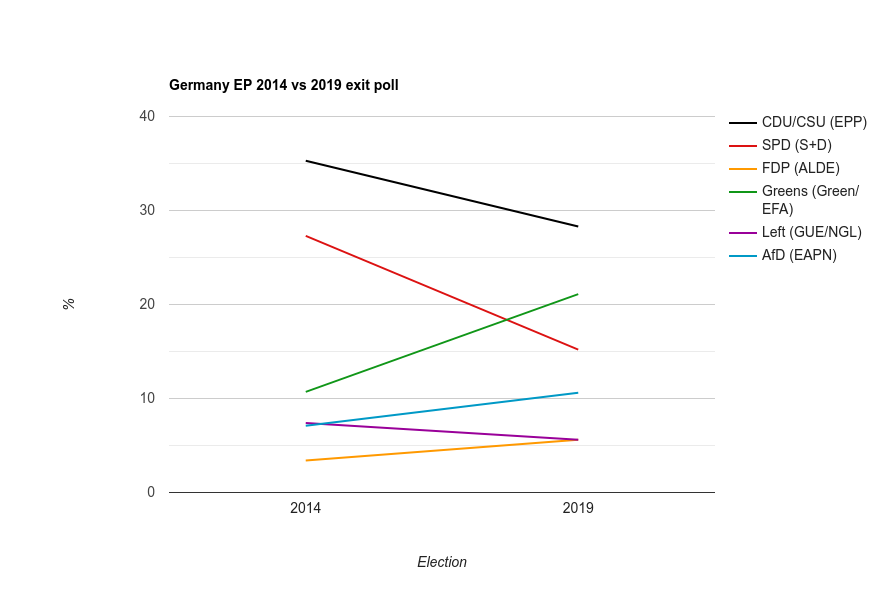
It will take some time to get nearly-final results for Germany, let alone for the EU, but the picture emerging from the exit polls in Germany is reasonably clear. So, in time honoured tradition, here are my hot takes:
- News of a far-right takeover were exaggerated, to say the least. The only relevant Eurosceptic party, the radical right AfD, performed a the lower band of expectations. While their vote share increased by three percentage points compared to 2014, they remained two points below their result in the 2017 Bundestag election. Given the EP elections are supposed to be second-order contests in which Eurosceptics in general and righ-wingers in particular vent their anger, this is really a bit embarrassing. Journalists will pin it on Ibiza-Gate, but the declining salience of migration, their string of funding scandals and last not least the AfD’s veering to the right that puts off more moderate voters are better explanations.
- Left-libertarian, pro-European views can be a vote winner. The Greens, who dared to propose “more Europe” and who put two prominent sitting MEPs on top of their list that, for want of a better word, could be described as “critical left”, doubled their vote share, winning as many votes as the two more traditional parties on the left combined.
- Multi-partyism is doing well in Germany. The party system may look more fragmented than it would in a federal contest because there is no threshold in place, but the drop is massive: in 2009, the two historically big parties CDU/CSU and SPD had a combined vote share of nearly 59 per cent. In 2014, this number was even higher at 63 per cent. Now we are looking at something in the range of 44 per cent. There also seems to be a massive increase in votes for “other” parties, but I have no details on this yet.
- It sucks to be a Social Democrat. The Christian Democrats are not doing terribly well, but they managed to remain the strongest parties by quite a margin. The SPD on the other hand have dropped well below a result of 20 per cent that was rightfully seen as disappointing in 2009 (in 2014, they clearly benefited from Martin Schulz being the leading candidate for the S+D). I know I keep banging on about this, but the result neatly illustrates the argument that Kitschelt made 25 years ago: Social Democrats are fighting a losing battle against New Left parties on the one hand and New Right parties on the other. At least in the German case, they are also competing with the Christian Democrats. It will be interesting to see to what degree this pattern applies to other countries, too.
Discover more from kai arzheimer
Subscribe to get the latest posts sent to your email.


RT @kai_arzheimer: 4 quick takes on the result of the 2019 European Elections in Germany – kai arzheimer https://t.co/uSYV2KKTRM
RT @kai_arzheimer: Left-libertarian, pro-European views can be a vote winner. @Die_Gruenen, who dared to propose “more Europe”, doubled th…
RT @kai_arzheimer: Left-libertarian, pro-European views can be a vote winner. @Die_Gruenen, who dared to propose “more Europe”, doubled th…
RT @kai_arzheimer: “News of a far-right takeover were exaggerated”
4 quick takes on the result of the 2019 European Elections in Germany ht…
RT @kai_arzheimer: “News of a far-right takeover were exaggerated”
4 quick takes on the result of the 2019 European Elections in Germany ht…
RT @kai_arzheimer: “News of a far-right takeover were exaggerated”
4 quick takes on the result of the 2019 European Elections in Germany ht…
RT @kai_arzheimer: Left-libertarian, pro-European views can be a vote winner. @Die_Gruenen, who dared to propose “more Europe”, doubled th…
RT @kai_arzheimer: 4 quick takes on the result of the 2019 #EP2019 result in #Germany – kai arzheimer https://t.co/1UVZu8ffO3 #Europawahl20…